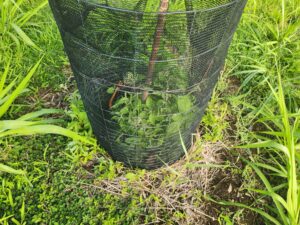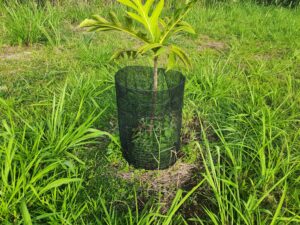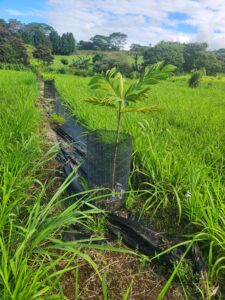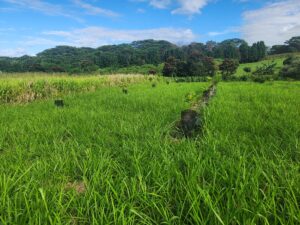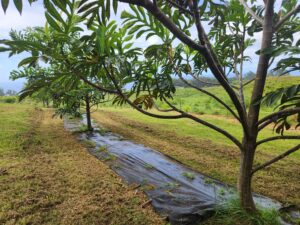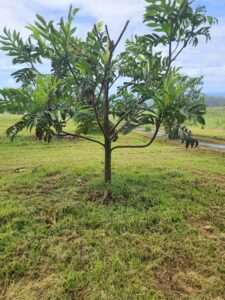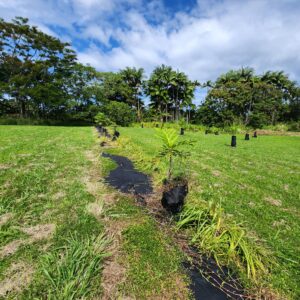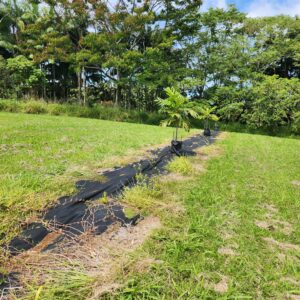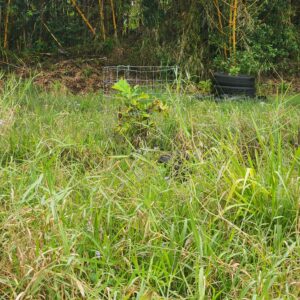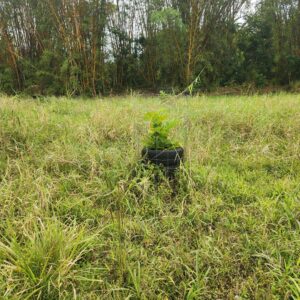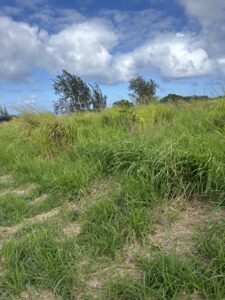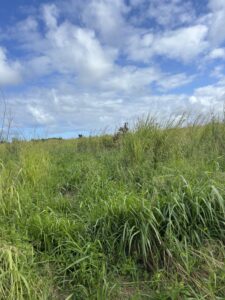Progress report for OW22-374
Project Information
This project seeks to compare and assess the effectiveness of breadfruit orchard establishment practices addressing two primary challenges that Hawaiʻi farmers face: weed management and ungulate control. Together these two challenges comprise the primary cause of young tree death observed in new orchard installations, causing approximately 20% mortality rates among planted trees reported over the past five years. Several treatments to mitigate each challenge will be implemented and compared among five working farms planting new trees during the first two years of the project period. In Year 3, working in partnership with the University of Hawaiʻi, results will be analyzed and best practice recommendations developed into one technical guide (PDF) and two educational videos, and disseminated through farmer networks using a combination of in-person workshops (2) and at least 100 one-on-one farm visits. The technical guide and video series will be accessible online and shared with producer organizations across Hawaiʻi and other breadfruit-growing regions. This project has great potential to improve agricultural sustainability in Hawaiʻi by reducing breadfruit tree mortality and increasing the success rate of new installations while enhancing farmers’ ability to establish and maintain food production systems using the limited resources available to them. Farmers losing young trees to pigs and intense weed competition currently constitute a significant financial loss across the state. As a result of this project, farmers will gain practical tools enabling higher tree survival rates, increased production, and strengthened economic fortitude.
-
- Through HUC’s farmer network of over 100 farmers, assess the effectiveness of several practices for sustainably managing weeds in young tree plots during new breadfruit orchard establishment or existing orchard expansion. Sustainable weed management practices to be compared were identified in collaboration with participating producers and include: mowing, weed mat, and the use of mulch. A two-year cohort study will be implemented on five sites around Hawai’i Island and monitored by participating growers.
- Through HUC’s farmer network, assess the effectiveness of several practices for feral ungulate control during new breadfruit orchard establishment or existing orchard expansion. Sustainable ungulate control methods to be compared were identified in collaboration with participating producers and include: physical barriers constructed from wire, rubber and wood materials. A two-year cohort study will be implemented on five sites around Hawai‘i Island and monitored by participating growers.
- Drawing on the empirical results and detailed observations from the cohort study as well as follow-up interviews with participating growers, the Agricultural Professional (AP) will work in partnership with land-grant institution the University of Hawai‘i at Mānoa College of Agriculture and Human Resources (UH CTAHR) and producer representatives to develop and distribute a technical factsheet sharing best practices and recommendations for weed management and ungulate prevention during tree establishment, including information on costs and benefits of various treatment approaches. Actionable recommendations on installation and sourcing materials will be included to help farmers make practical and effective decisions.
- The AP will manage and produce two educational videos from the data and analysis presented in the technical factsheet in collaboration with project partners. The purpose of these videos is to share learned methods and implementation techniques with farmers who cannot attend workshops or live in areas outside of HUC’s physical reach.
- Hold three in-person workshops open to HUC’s network of 100+ breadfruit producers and the broader Hawai‘i farming community. AP will organize one workshop at each of three member farm locations on three different islands during the final year of the project.
- Complete at least 100 in-person, one-on-one farm visits with producers in HUC’s farmer network during the project period to disseminate project results and gather feedback from growers via surveys and structured interviews to assess project impacts.
The proposed research and education objectives will be completed within the scope of the three-year timeline provided in the Project Tracker Table below:
Project Tracker Start Date: 04/02/2022 End Date: 12/31/2025 *NCE approved by WSARE staff - details below
Site visit 6 and 7 were mistakenly copied in to the schedule but were after the trial end date. Final site visits will occur at the end of the trial period in the first week of May 2025.
|
Position |
Start Date |
End Date |
Milestone/Activity |
|
1 |
4/2/2022 |
5/1/2022 |
Site Planning Meeting w/ Farmer Cohort *Complete |
|
2 |
5/2/2023 |
5/2/2025 |
Research Observation Period: Ungulate Control * In progress |
|
3 |
5/2/2023 |
5/2/2025 |
Research Observation Period: Weed Management *In progress |
|
5 |
5/5/2023 |
5/28/2023 |
Site Visit 1 * Complete |
|
6 |
10/1/2023 |
10/31/2023 |
Site Visit 2 * Complete |
|
7 |
5/5/2024 |
5/28/2024 |
Site Visit 3 * Complete |
|
8 |
10/1/2024 |
10/31/2024 |
Site Visit 4 * Complete |
|
9 |
5/3/2025 |
7/1/2025 |
Develop and Design Technical Fact Sheet: Due July 1, 2025 |
|
10 |
5/3/2025 |
7/31/2025 |
Ungulate Control Video Development: Due July 31, 2025 |
|
11 |
5/3/2025 |
8/31/2025 |
Weed Management Video Development: Due August 31, 2025 |
|
12 |
9/1/2025 |
9/29/2025 |
Workshop 1: Announcement and Execution |
|
13 |
10/1/2025 |
10/31/2025 |
Workshop 2: Announcement and Execution |
|
14 |
11/1/2025 |
11/30/2025 |
Workshop 3: Announcement and Execution |
|
15 |
12/1/2025 |
12/31/2025 |
Project Evaluation and Assessment + Reporting |
Cooperators
- - Producer
- - Technical Advisor
- - Producer
- - Producer
- - Producer
- - Producer
Research
The proposed project is guided by two overarching research objectives, stated below along with specific methods and materials used to accomplish each objective. Progress updates are included to reflect installation of trials in the field and current status of each trial site, treatment numbers and adjustments in the work plan due to selecting best methods on a site-specific basis depending on acreage, available equipment, and environmental conditions as well as the preferences of the individual producers.
Research Objective #1) Through HUC’s farmer network, assess the effectiveness of three practices for sustainably managing weeds in young tree plots during new breadfruit orchard establishment or existing orchard expansion. Sustainable weed management practices to be compared were identified in collaboration with participating producers and include: mowing, mulching, and the use of weed mat. The number of treatments was reduced to three types in order to accommodate producer needs, available equipment and acreage, and consolidation of data for the purpose of the study. A two-year cohort study has been installed and is currently being monitored on a site-specific basis depending on acreage, available equipment, and environmental conditions. AP will visit farms in-person to assess conditions, record observations, and communicate with producer partners about the progress of treatments.
Research Objective #1 Timeframe: *AP has implemented an approved timeline extension + project modification to adapt to adjustments in the work plan to extend research period to April 2023- April 2025; educational materials + workshops to be produced in 2025 along a similar timeline as the original submission; see approved modification request.
Progress Report Updates for April 1, 2025:
*Project tasks were paused briefly during the first quarter of 2025 due to funding restrictions as a result of decisions made by the current presidential administration as of January 28, 2025. As of March 20th, the project was given the confirmation to continue and will maintain previously described timeline goals. In addition - one producer site, Richard Kodani, is no longer able to maintain the site due to excessive feral pig intrusion, and has transitioned his 30 trees to a control group. No mowing, weeding, or maintenance of the installed practice infrastructure will be completed. Richard will no longer receive incentive payments for mowing the site, but will continue to be included in producer interviews and resource development.
Weed management treatments have been implemented at all of the 5 producer sites, after initial site visits and producer meetings with the AP and producer in charge of each site to determine best practices for each farm based on acreage, availability of equipment, environmental conditions and producer input. Below is a table showing how many trees are represented in each treatment style. Quarterly reports have been maintained beginning in August 2023 and continuing through December 2024 for each of these treatments throughout the various sites and will be used in the project's final assessment and educational materials. See photos below from the most recent data recording session.
| Andrew Trump | Tom Menezes | Richard Kodani | Brett Lomont | Shawn Pila | |
| Treatment A - Mowing |
10 |
14 | 30 | 7 | 0 |
| Treatment B - Weed Mat | 10 | 8 | 10 | 8 | 12 |
| Treatment C - Mulching | 10 | 10 | 14 | 8 | 18 |
Research Objective #2) Through HUC’s farmer network, assess the effectiveness of three practices for feral ungulate control during new breadfruit orchard establishment or existing orchard expansion. Sustainable feral ungulate control methods to be compared were identified in collaboration with participating producers and include: physical barriers constructed from wire, rubber materials, and existing permanent fencing. The number of treatments was reduced to 3 types in order to accommodate producer preferences, available equipment and acreage, and consolidation of data for the purpose of the study: cages, tires, and permanent fencing. Pallet fences were left out as Producers considered them unsightly and would have required additional treatment for weather protection as well as making weed management more difficult than cages or tires. A two-year cohort study has been installed and is currently being monitored on a site-specific basis depending on acreage, available equipment, and environmental conditions. AP will visit farms in-person to assess conditions, record observations, and communicate with producer partners about the progress of treatments.
Research Objective #2 Timeframe: AP has implemented an approved timeline extension + project modification to adapt to adjustments in the work plan and the loss of one of the initial project partners to extend research period to April 2023- April 2025; educational materials + workshops to be produced in 2025 along a similar timeline as the original submission; see modified schedule for more information.
Progress Report Updates for April 1, 2025:
**AP has implemented the approved timeline extension + modification to accommodate adjustments in the work plan/installations in the field. One producer dropped out of the trial program and was successfully replaced by another producer with similar conditions, Shawn Pila.
Ungulate prevention treatments have been implemented at 5 of the 5 producer sites in the past year, after initial site visits and producer meetings with the AP to determine best practices for each farm based on acreage, availability of equipment, environmental conditions and producer input. Below is a table showing how many trees are represented in each treatment style. Quarterly reports have been maintained beginning in August 2023 through December 2024 for each of these treatments throughout the various sites and will be used in the project's final assessment and educational materials. See photos below from the most recent data recording session.
| Andrew Trump | Tom Menezes | Richard Kodani | Brett Lomont | Shawn Pila | |
| Treatment A - Wire Cages | 0 | 14 | 21 | 0 | 30 |
| Treatment B - Used Tires | 0 | 7 | 20 | 0 | 0 |
| Treatment C - Pallet Triangles | 0 | 5 | 0 | 0 | 0 |
| Treatment D - Permanent Fencing | 30 | 0 | 0 | 21 | 0 |
As of March 20thth, 2025 this project is on track for field observations to continue through the study end date in May 2025 after a brief pause in data recording due to the future of project funding being in question. Educational materials and workshops + outreach will still be completed on a similar timeline as the originally submitted report; see approved modified schedule and current progress photos below.
Proposed Project End Date: 12/31/2025
1 - Site Planning Meeting w/ Farmer Cohort ( This portion is complete as of 3/31/2023; see above tables for details)
4/2/2022
5/1/2022
2 - Research Observation Period: Ungulate Control - This is in progress
5/2/2023
5/2/2025
3 - Research Observation Period: Weed Management- This is in progress
5/2/2023
5/2/2025
4 - Site Visit 1: Complete as well as additional quarterly data checks
5/5/2023
5/28/2023
5 - Site Visit 2: Complete as well as additional quarterly data checks
10/1/2023
10/31/2023
6 - Site Visit 3 - Complete as well as additional quarterly data checks
5/5/2024
5/28/2024
7 - Site Visit 4 - Complete as well as additional quarterly data checks
10/1/2024
10/31/2024
8 - Site Visit 5 * Removed from schedule as it is after trial period ending
5/5/2025
5/28/2025
9 - Site Visit 6 * Removed from schedule as it is after trial period ending
10/1/2025
10/31/2025
10 Develop and Design Technical Fact Sheet: Due July 1, 2025
5/3/2025
7/1/2025
11 - Ungulate Control Video Development: Due August 1, 2025
5/3/2025
8/1/2025
12 - Weed Management Video Development: August 1, 2025
5/3/2024
8/1/2025
13 - Workshop 1: Announcement and Execution
9/1/2025
9/29/2025
14 - Workshop 2: Announcement and Execution
10/1/2025
10/31/2025
15 - Workshop 3: Announcement and Execution
11/1/2025
11/30/2025
16 - Project Evaluation and Assessment + Reporting
12/1/2025
12/31/2025
Include Photos Here:
Image 1: Shawn Pila - Cage and mulching treatment
Image 2: Shawn Pila - Cage and mulching treatment wide shot
Image 3: Shawn Pila - Cage and weed mat treatment
Image 4: Shawn Pila - Cage and weed mat treatment row (right), cage and mulching treatment row (left)
Image 5: Brett Lomont - Weedmat treatment
Image 6: Brett Lomont - Mowing treatment
Image 7: Tom Menezes - Cage and Weedmat treatment
Image 8: Tom Menezes - Cage and Weedmat treatment
Image 9: Richard Kodani - Cage and Mowing treatment
Image 10: Richard Kodani - Cage and mulch treatment
Image 11: Island Harvest - Mulching treatment
Image 12: Island Harvest - mulching treatment
Up to date there has not been any results or findings as the study period is still underway. Anecdotally so far there have been significant issues with ungulates at 2 of the sites but prevention method data is yet to be analysed until the end of the 2 year period.
Research Outcomes
No recommendations at this time, will consider upon project completion and creation of educational materials.
Education and Outreach
Participation Summary:
At the end of the trial period the AP will use recorded data and producer statements to create a visual guide and workshop presentation for Hawaii farmers. Upon completion of the project a series of educational workshops and videos will be created and shared along with the visual guide to HUC's vast network of farmers and collaborators, and made available online on our website of producer resources.
This project is still underway and we have yet to begin any education and outreach efforts
Education and Outreach Outcomes
There is planned outreach utilizing educational materials at the end of the project period. Results will be disseminated through the cooperative's extensive collaboration with complimentary organizations paired with our own workshops on the topics.
This will be data that is collected upon the completion of the study
